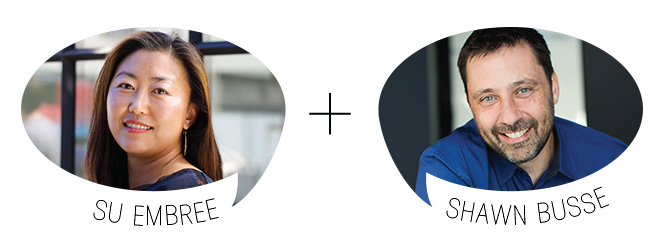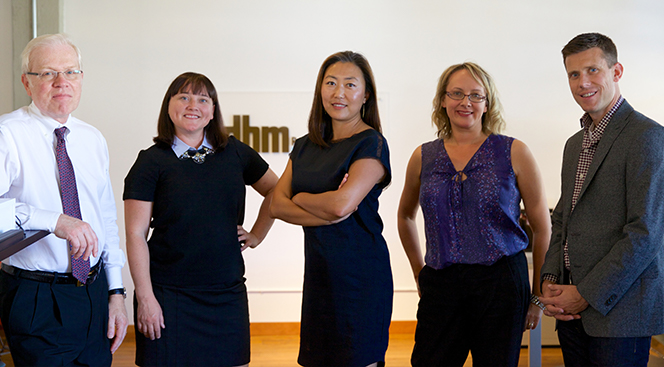
Culture in Mergers & Acquisitions
When it comes to Mergers and Acquisitions, one major contributor to the valuation process often gets overlooked: company culture.

Our Accelerator Interview series, “Thinking Big” is our way of sharing insights from successful business leaders within the Kinesis community.
DHM Research is an independent and nonpartisan public opinion research firm that gives a voice to average people on issues that matter to them. They work with government agencies, communications firms, and nonprofits across the country to plan and develop smarter policies. Today we sat down with DHM’s President, Su Embree.

Shawn: Hi Su. Thanks again for sharing your insights and experience with the Kinesis Accelerator readers. Tell our readers a little bit about DHM and what you do…
Su: We study the values and beliefs of everyday people. We are data geeks and love what we do. People know DHM as a public opinion research firm, but our core work is to give voice to communities across the country. My team takes great pride in telling a story with data to impact public policies for the common good. We work with elected officials, corporate executives, and community leaders on issues that we all care about – like funding education, clean air and water, fixing roads, and renewable energy.
Shawn: That’s a great summary. If memory serves, DHM has been around for over 45 years and has had several shareholders along the way. This is interesting on two levels: First, not many small businesses have that kind of staying power; more significantly, sometimes it can be challenging for a small business to succeed at an ownership transition. What can others learn from DHM’s journey?
Su: I was employee number 3 back in 1997. We had the smallest office. Makes me laugh just thinking about the three of us crammed into that box with a conference table that filled up most of the room. I still have that dang table in our much nicer Pearl District office!
Our staying power, and I believe the staying power of any business, is based on the quality of our work. High quality work is one of our values. It drives so much of what we do – from how we hire, to number checking our reports, to the policy issues we choose.

I came into this business because I was too disruptive at a large corporation. I needed a small business that was open to change. Toward the end of my first year at Davis & Hibbitts (the name of the company at the time), I approached the founders and set up a performance review. I showed them a booklet of my progress and asked them to not increase my salary. I asked for a percentage of the profits instead. I was sure we could grow the business and increase revenue the next year. I think I was 24 at the time and I knew it was a risk, but I was confident in improving internal systems that would allow us – the three people – to increase the number of projects and also raise profit margins. I did pretty well that second year, and eventually turned profit sharing into ownership. So I would say that small business needs to be open to risk and change, especially if it comes from employees.
Shawn: You make a great point – so often business leaders are closed off to new ideas, or not sure which ideas to listen to. In fact, I recently did a quick search on the term “leadership” in the Amazon bookstore. Not surprisingly, the search came back with over 100,000 responses. Given that there’s no shortage of information on leadership, volume isn’t the problem…but rather knowing what works in the day-to-day. What are the guiding principles you use to help DHM grow and thrive?
Su: I’m not surprised. 100,000 is overwhelming. Just like with data, if you have too much information, you don’t know where to start. It often paralyzes people from action or even taking small steps. My leadership principles are simple: listen more than you talk; empower people through words and action (both are critical); connect to values as often as possible. I’m a strong believer that once you hire the right people, leaders should get out of the way. I used to think that more projects fueled growth. I was so wrong. People spur growth and innovation.
Shawn: And, of course you know I’m going to ask the flip-side of that question…what are some of the cautionary tales learned from mis-steps in your early career?
Su: Oh, I have many. I’ll share one very specific example. I was a ‘full participation’ leader. I was participating in almost every company meeting and oftentimes leading them. It took an outside management consultant, Ted Servata, to ask if I needed to be at all of these staff meetings. No one had asked me that before. I thought being present was showing support. My leadership team does a better job leading internal meetings and I don’t need to be there. I cut my internal meetings down to two per week – a leadership call each Monday morning and strategy review with my VP of Operations where we go over key performance metrics. I can support the company by being in front of clients and in the community. I swear that one question gave me at least 15 hours in my week to do other things.
Shawn: Okay, I’m going to pivot now to some of the recent work DHM has done. There was an interesting piece in the Oregonian last month about Portland’s economy and voter sentiment (your firm did the research). What I found most fascinating was that the majority of respondents thought the region was moving in the right direction, but that the quality of life was getting worse. What are your thoughts on this trend and the ramifications for small businesses in the Portland metro?
Su: Portlanders are a positive bunch. We love this city and the community around us. That was evident in our research. The right direction numbers are over 50% – which means people are feeling better about a lot of things, and especially the economy. We saw right direction numbers in the mid 20% during the recession. Numbers that are low are uncommon for our region. I’m glad that people are feeling better about their economic opportunities. It means people will consider supporting issues that make our community stronger – like schools, parks, libraries, public safety, and transportation. We need those things for a healthy community, and a healthy community is good for business.

Brad Schmidt | The Oregonian/OregonLive
Portland cares about its community and the people in it. The concern about quality of life is rooted in people’s concern about homelessness in the region and the high cost of housing – both are related. These two issues require smart public policies and leadership in our community.
Shawn: I just love some of the local and regional insights from your blog. But here’s the challenge: most business owners are too busy to do the deep research that separates the signal from the noise. Knowing that your work involves both breadth and depth, what are a few trends that maybe haven’t received a lot of press, but that merit the attention of Portland-area business owners?
Su: Here are some data trends worth watching:
Concern over homelessness, housing, and traffic will only increase. We have to come together as a business community to be part of the solution. People are being impacted by each of these issues in their everyday lives now. It’s impacting the lives of our employees. Homelessness is no longer that person on the sidewalk in Old Town – people now see tents in their own neighborhoods. In this tight labor pool, employers are facing higher wages to be competitive, and these wages are helping our employees afford their rent increase, to send their kids to preschool, or to buy food. All cost of living expenses.
Oregon, and Portland much more so, leans toward the environment over business interests. Voters will support initiatives to protect our natural areas, water, air, fish, and wildlife. The environment is the number one issue for Millennials and Generation Z. (Yes, the new generation is known as Generation Z (after Gen X and Gen Y). If you were born after 2000, you’re in this generation. Watch how they spend their dollars. This group does their research.) Businesses and industries have to find a balance when their work impacts the natural environment around them, and it may cost more to do business here.

Cannabis business will continue to spread across the US. I believe in Oregon local communities will eventually look at taxing cannabis to fill the gaps left by what was once a thriving timber industry. Some of our rural areas have double digit unemployment because we haven’t replaced those lost timber jobs.
Shawn: Well, speaking of progressive trends, let’s focus on women in business. First, the good news: In America, nearly a third of all small businesses are owned by women. And, this group is growing: from 1997 to 2014 the number of women-owned firms increased by 68%. Now the bad news: less than 5% of Fortune 500 CEOs are women, barely a third of ranked MBA cohorts are female, and women business owners make just 25 cents on the dollar compared to their male counterparts. While there’s considerable debate behind the why of these statistics, what can forward-thinking leaders do to help provide opportunities to all groups that are underrepresented in the business world?
Su: Another fact is that women get 5 cents to every dollar a man gets in capital. And female entrepreneurs of color get even less. This trend has to change to reflect the reality that more women and people of color are starting businesses in communities across the country. Consumers are reflecting this changing demographic which is good for women and minority owned businesses. The current financial barriers make it difficult for many women and minority owned businesses to even get started, let alone expand, or take bigger risks. The ability to take risk is so paramount to growing a business, and having access to capital is key to risk-taking.
The bright side is that more women are starting businesses (using their own money or money from family and friends), graduating from business school, getting law degrees, coming out of medical school, and culinary schools. There are more of us in the workforce. If you want to support these emerging businesses, consider these questions then act on them:
Shawn: Ok, last question. We’re awash in data and information these days. If you could wave your magic wand and change one thing about how we absorb data and make decisions, what would that be?
Su: Stop reading data and news that is sent to you in your feed. Start searching and absorb a variety of sources. We get better perspective this way.
As business owners, it’s helpful to know what’s going on in the broader community and outside of our own companies. We all make better decisions if we’re informed. I would encourage business owners in the city to join the Portland Business Alliance. The leadership and staff are incredible and some of the smartest people when it comes to policies that impact businesses. For founders and entrepreneurs, I can’t say enough about Entrepreneurs’ Organization, a peer to peer learning group. It’s been one of my best investment in my professional growth. Owners benefit from having our egos checked – entrepreneurs can do that for each other.
You can learn more about Su and the work DHM does by visiting their website.
Get insights like this straight to your inbox.